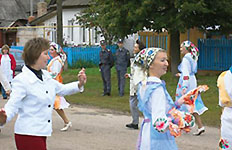Russian security forces keep tight rein on Finno-Ugric congress in Mari
Republic
31.08.05
President says all problems "provoked or invented by Finnish media"
By Kirsikka Moring
 The
International Congress of Finno-Ugric Studies, which concluded at the weekend
in Joskar-Ola, the capital of Russia's Mari El Republic, did not yield
much in the way of linguistic science or anthropology, but in other respects
the meeting was quite colourful. The
International Congress of Finno-Ugric Studies, which concluded at the weekend
in Joskar-Ola, the capital of Russia's Mari El Republic, did not yield
much in the way of linguistic science or anthropology, but in other respects
the meeting was quite colourful.
Already before the gathering the militia
and security forces of the republic held conspicuous "rescue exercises".
The local Mari El newspaper reported on the exercises, which were aimed
at practising repulsing attacks by "terrorists and other extremist elements".
According to the paper, there was no
reason for participants to fear, as the congress was being monitored by
the city's entire police force.
In one of the police exercises, the officers rehearsed removing
a bomb from the location of the congress - the large stage of the Mari
National Theatre. In another exercise they defused a dummy explosive in
a Lada parked on a highway, and in another, they captured a terrorist after
a shooting incident.
In the imaginary situation, a sniper
was removed from the building where the guests of the congress were housed.
"It was in this atmosphere that we were
supposed to engage in scientific discourse", said Riho Gr�nthal,
Professor of Baltic Finnish Languages at the University of Helsinki.
"In the West we feel that one of the
important tasks of universities is societal interaction. In Mari this seems
to be impossible."
 Fewer
than 40 researchers from Finland took part in the congress, even though
over 80 had registered. The delegations of Estonia and Hungary had also
shrunk to less than half. There were only about 20 Estonians, and just
under 40 Hungarians. Fewer
than 40 researchers from Finland took part in the congress, even though
over 80 had registered. The delegations of Estonia and Hungary had also
shrunk to less than half. There were only about 20 Estonians, and just
under 40 Hungarians.
Some of the scientists, such as Finnish
Professor Pauli Saukkonen, had stayed away to protest the policies
of the government of the Mari Republic, which has been accused of oppressing
the ethnic Mari in the region.
There were only about 500 people taking
part in the congress, even though the number of participants had been expected
to exceed 1,000.
An atmosphere of anxiety prevailed.
In the working groups the shortage of experts caused certain
problems. Only half of the presentations marked in the programme were held,
and the timetables were not kept.
Finnish participants said that science
turned into politics. Their local colleagues were ordered not to discuss
anything concerning the problems of the republic. Anyone asking a question
about a controversial matter was faced with a brick wall of silence.
The foreign guests were constantly followed
by police, and an entire police convoy would accompany each of the various
excursions. It was certainly safe, but it was difficult to meet ordinary
residents, and photography was also restricted.
The scrutiny went so far that mobile
phones used by Finnish participants were silenced when they tried to set
up meetings with local colleagues.
Scheduled meetings were cancelled, when
a local colleague was suddenly compelled to go on holiday on the day in
question. The Mari participants at the congress were also threatened with
"repercussions" after the departure of the foreign guests.
 Municipal
leaders would often begin their speeches by saying "Thanks to President
Leonid Markelov, we are doing well". After a folk dance performance
it was said: "Only a happy nation dances like this!" Municipal
leaders would often begin their speeches by saying "Thanks to President
Leonid Markelov, we are doing well". After a folk dance performance
it was said: "Only a happy nation dances like this!"
The Mari, who are known for their hospitality,
received their foreign guests well. Food and drink was abundantly available,
but the assistants at the congress did not get a single kopek for their
work.
The Finnish Ambassador to Moscow, Harry
Helenius, hosted a reception for the participants of the congress together
with the Estonians and Hungarians.
Also holding a reception was President
Markelov, where the focus was on how well things are going in the Mari
Republic. According to the President, all problems are provoked, or invented,
by the Finnish media.
The status of minority languages in Russia does not look good
in the light of the congress. The Finnish participants are especially concerned
about the marginalisation of the national languages, which they fear could
be rendered into "museum languages" of rural villages.
National languages are not favoured
in the cities. Radio and television programmes are being reduced further,
and language education is being pruned away. The position of teaching of
the mother tongue is especially grim in the schools of Udmurtia.
The linguists taking part in the congress
suspected that languages that are limited to rural villages lack the possibilities
for vital cultural and linguistic modernisation.
Regional development and the construction
of new regional centres are, in their view, almost at a complete standstill
in Mari.
The next International Congress of Finno-Ugric
Studies is to be held in five years time in the Hungarian university town
of Piliscaba.
Source: Helsingin
Sanomat - International Edition
|